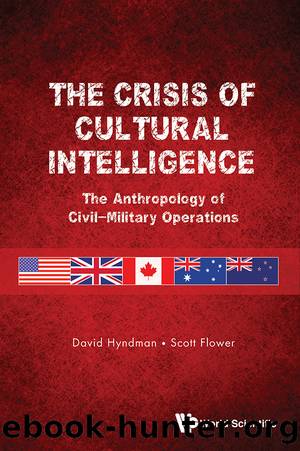The Crisis of Cultural Intelligence by David Hyndman Scott Flower

Author:David Hyndman, Scott Flower [David Hyndman, Scott Flower]
Language: eng
Format: epub
ISBN: 9789813273634
Barnesnoble:
Publisher: World Scientific Publishing Company, Incorporated
Published: 2019-01-30T00:00:00+00:00
There is an assumption in settler discourse that without control and enforced order Canadian society cannot exist.
During this period there was significant engagement of Canadian anthropologists with Fourth World and First Nation issues. One of the first contributions was Hugh Brodyâs Maps and Dreams: Indians and the British Columbia Frontier (1981), which presented an innovative analysis of Beaver Indian resistance to an oil pipeline on their land. Noel Dyckâs Indigenous Peoples and the Nation-State: Fourth World Politics in Canada, Australia and Norway (1985), which included contributions from Dyck on the Fourth World concept, Harvey Feit on Cree opposition to the James Bay hydro project, Robert Paine on the Saami and Sally Saunders comparison of Canada and Australia. According to Native Studies Review (1986): âthis volume provides the reader with both the theoretical overview and sufficient case material to develop an understanding of the political issues facing the peoples of the Fourth World.â
International legal solutions to Indigenous nation-state relations are found in the right of âpeoplesâ to self-determination, from free association with the encapsulating state to secession from it. Indigenous nations understand the historical treaties to be a freely negotiated and terminable organic relationship, with mutually agreeable recognition that indigenous jurisdiction ârests upon inherent right and not a revocable grantâ (Lam, 1992: 608).
Kymlicka (1998) contrasts between Anglophone Canadian ideas about (con-federation) with Francophone Quebecâs sense of ânationâ and extends the concept to the First Nation peoples in Canada. The nation-ness of the First Nations is an outcome of Canadaâs colonial society, both in its history and in its internal configuration of Indigenous nation-state relations. National identity is not monolithic within Canada. The Haudenosauee (Iroquois) of the Grand River Territory issue their own passports. The Assembly of First Nations is pluralistic and contains 630 chiefs representing 50 Indigenous nations. First Nations are nation peoples in the plural because they so define themselves and they take for granted a transnational insistence on Indigenous nation to state status in negotiating the relationship of the First Nations to the Canadian state and to other nations, states and international bodies (Darnell, 2010).
By the end of the 20th century, anthropologists were no longer ethnographically engaged with studies of Indigenous nation-settler colonial state relations; they:
âfound it expedient, if not necessary, to withdraw from making larger pronouncements concerning economic, political and other relations within Indigenous societies and between these societies and the states within which they found themselves.â
(Asch, 2003)
Download
This site does not store any files on its server. We only index and link to content provided by other sites. Please contact the content providers to delete copyright contents if any and email us, we'll remove relevant links or contents immediately.
| Arms Control | Diplomacy |
| Security | Trades & Tariffs |
| Treaties | African |
| Asian | Australian & Oceanian |
| Canadian | Caribbean & Latin American |
| European | Middle Eastern |
| Russian & Former Soviet Union |
The Secret History by Donna Tartt(19086)
The Social Justice Warrior Handbook by Lisa De Pasquale(12190)
Thirteen Reasons Why by Jay Asher(8909)
This Is How You Lose Her by Junot Diaz(6886)
Weapons of Math Destruction by Cathy O'Neil(6279)
Zero to One by Peter Thiel(5801)
Beartown by Fredrik Backman(5754)
The Myth of the Strong Leader by Archie Brown(5507)
The Fire Next Time by James Baldwin(5442)
How Democracies Die by Steven Levitsky & Daniel Ziblatt(5218)
Promise Me, Dad by Joe Biden(5153)
Stone's Rules by Roger Stone(5087)
A Higher Loyalty: Truth, Lies, and Leadership by James Comey(4962)
100 Deadly Skills by Clint Emerson(4925)
Rise and Kill First by Ronen Bergman(4788)
Secrecy World by Jake Bernstein(4753)
The David Icke Guide to the Global Conspiracy (and how to end it) by David Icke(4717)
The Farm by Tom Rob Smith(4507)
The Doomsday Machine by Daniel Ellsberg(4490)
